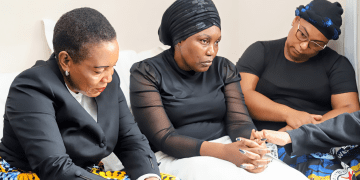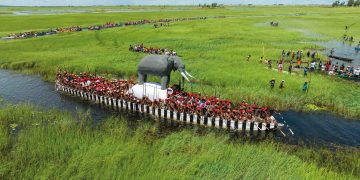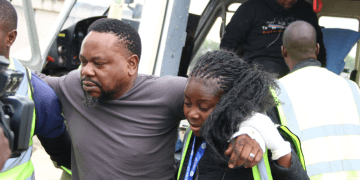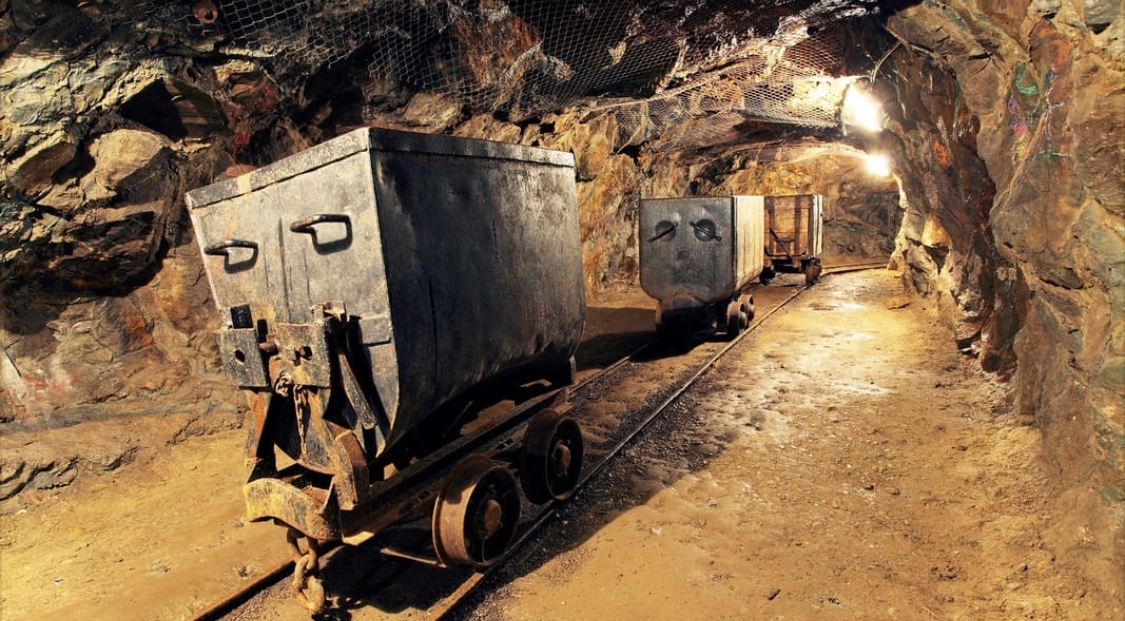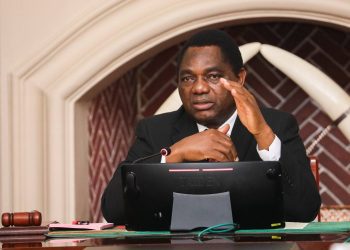By Charles Mafa
For 24-year-old Webby Kyaiwa his two missing fingers are a constant reminder of the traumatic short stint at a Chinese copper mine in north-western Zambia where he was employed as a casual worker.
Kyaiwa said he was lifting rocks at Jifumpa Mine’s underground site sometime in 2019 when his fingers on the left hand were crushed by the mine hutch after a machine operator accidentally set it in motion.
His employer assisted him to get treatment at the nearby Mukinge Mission Hospital, but he lost his job soon after he was discharged from hospital when his short-term contract expired.
“It happened when we were lifting rocks underground, so the gentleman who was operating the machine pulled it without alerting us,” Kyaiwa recounted his ordeal.
“The incident left my hand like this,” he added, showing the missing fingers on his hand.
Kyaiwa’s tragic story was uncovered through a month-long investigation by MakanDay with support from the Information Development Trust (IDT), a non-profit organisation supporting journalists to probe corruption and bad governance in Southern Africa, into alleged rampant abuse of workers by Chinese owned small scale copper miners in northwestern Zambia.
A source at Mukinge who has access to the clinical data registry, confirmed that Kyaiwa was admitted to the hospital on 15 May and discharged on 19 of the same month in 2019 for treatment of his hand.
He disclosed that between 2019 and 2021, 12 workers from Jifumpa Mine have been admitted to the hospital for treatment of various injuries.
According to hospital records, the most frequently reported injuries from miners are fractures, cuts and bruises. Others are injuries to the fingers and shoulders.
“My findings are that many are admitted, but they don’t just give the address of the mine, but give their villages addresses when they get hospital admissions,” he disclosed.
Senior Chief Kasempa said some of the injured miners at Jifumpa have been to his palace to complain about the lack of compensation from the mine owners.
Zambia’s Mines Safety Department (MSD) is responsible for safety and health of mining industry employees and mineral processing in line with the provisions of the Mines Minerals Development Act.
Some of the department’s responsibilities includes, “the protection of human health, in consultation with the Minister responsible for health”.
The MSD is also responsible for carrying out inspections, mining safety audits and risk assessments in mines.
On 01 April this year, MakanDay wrote to the director of mines in Ndola on the Copperbelt, requesting for data about mine accidents that have occurred between 2016 and 2021, especially for Jifumpa, but to this day it has not been provided.
A month later, Fred Banda – the director advised that the request be channeled through the office of the Permanent Secretary in the Ministry of Mines in Lusaka, who has not yet replied to MakanDay’s letter of 19 May.
The MSD in the Ministry of Mines is supposed to ensure compliance with health and safety regulations. But understaffed, underfunded, and facing allegations of corruption—it provides little effective regulation of mining companies.
Complaints piling up against the Chinese
The miners are also accused of scooping natural resources in the region without ploughing back into the impoverished community.
At Jifumpa Mine tempers flared as disgruntled workers and community leaders spelt out their grievances against the mine owners in interviews with MakanDay.
The mine is situated deep inside a thick forest some 95km south of Kasempa town, which is 260 km south-west of Solwezi, the provincial capital of the North Western Province.
The route to Jifumpa from Kasempa is a long winding stretch of a bumpy road that the Chinese miner promised to upgrade after being given permission to mine in 2016, but nothing has been done five years after operations started.
Locals say the mine has brought nothing other than deaths and injuries to the miners and misery to the people in the area, which was once an isolated settlement surrounded only by pristine forests.
The vehicle carrying the MakanDay crew was still in motion when a group of miners surrounded it itching to tell their story.
They were still clad in their work suits and looked exhausted after a night shift in the mine’s underground shafts.
The workers sat on makeshift wooden benches at a hut close to the mine’s entrance to narrate their experiences.
Deaths to the miners
They claimed that six fellow workmates died last year alone following preventable accidents at the mine.
“In February (2021), one man died near a pump that pumps water from Lunga River to the mine,” alleged one of the miners. “In March another one died and in May three died while working underground.”
The miners said most of the deaths were due to electrocution in the mine shafts due to poor electricity installations.
“We could quit our jobs here anytime, but there are no jobs in this country,” added a youthful miner.
Although some of the deaths were confirmed by the local hospital, the Mines Safety Department in the Ministry of Mines has not responded to queries about the alleged deaths at the mine.
Copper mining is the lifeblood of the Zambian economy, contributing nearly 75 percent of the country’s exports and two-thirds of the central government revenue.
Experts say China’s significant investment in Zambia’s copper mining industry can benefit both Chinese and Zambians. But the miners in Chinese-run companies have been subject to abusive health, safety, and labour conditions and longtime government indifference.”
Levy Kapatamoyo*, who said he went to Jifumpa from Mwinilunga – another district in northwestern Zambia, in search of a life-changing job, is on the verge of quitting after toiling the Chinese copper mine for a few months.
“I can’t see myself continuing working for this mine,” Kapatamoyo said. “It is only because we are poor.”
He said the poor working conditions and low salaries have made it impossible for him to save enough money to send back to his wife and their two children back home.
Another miner added: “My monthly salary is K2,600 (US$146), when I work for the whole month, it comes to K2,800 (US$157), but if you get sick, they deduct money for the days you fail to report for work.”
Although the K2,600 (US$146) is within the minimum wage for Zambia’s mining industry, the Jifumpa pay rate is too low when compared with the work miners do hauling the minerals from underground for export.
The mine workers also complained about inadequate personal protective equipment with some complaining that torn boots provided by their employer were a hazard in water-logged underground surfaces.
Mine ownership
Jifumpa Mine is run by Ruida Investments Limited, who are holders of an exploration licence number 19623-HQ-LPL for copper and cobalt exploration.
The mining rights to Jifumpa Mine were previously held by Hetro Mining.
According to the Patents and Companies Registration Agency, the company directors are Chinese nationals, Cao Tingjia and Meide Qun, while Ke Baoming is a shareholder.
The company was incorporated on 28 May 2014 and is into farming, support activities for mining and quarrying and retail as well as freight transport.
Morgan Kazembe, the Jifumpa Mine human resources manager who spoke on behalf of the Chinese, referred MakanDay to the Mine Workers Union of Zambia (MUZ) when asked for his Chinese superiors to comment about the workers’ grievances.
“Can you kindly engage officials from MUZ as they are engaged on the matter and the Ministry of Labour,” Kazembe said.
MUZ president Joseph Chewe said the union had teamed up with the Ministry of Labour to educate the workers about their rights.
“That is the first step we have taken to educate the workers about their rights, labour laws, and working conditions at the mine as well as safety hazards,” Chewe said.
“We’ve learnt that the majority of the employees have never worked anywhere else and it’s possible that they have unrealistic expectations.”
Labour commissioner Givens Muntengwa said it was not the duty of the Labour Ministry to negotiate on behalf of employees, but to bring industrial harmony in the sector.
“It is not the duty of the ministry to ask the employer to improve the terms and conditions of service,” Muntengwa said.
“It’s not our duty, but that of the union and the employees who are represented.”
The chief’s cry
At Jifumpa the local chief’s palace, some five minutes’ drive from the mine, the MakanDay crew was presented with a long list of grievances.
Chief Kasonso’s palace sits at the edge of Lunga River. Looking down on the river from the hillside, the traditional leader started by providing a catalogue of natural resources in his area. The chief died few months after the interview. May His Soul Rest in Peace.
“I have Kafue National Park, I have Kasonso – Busanga Game Management Area hunting block… and I also have Jifumpa Mine, but I don’t get anything, not even the 5 percent from all these resources,” he lamented.
Chief Kasonso said he was disillusioned because his subjects were not benefiting from natural resources in the area, including rich copper deposits.
“Even here where I am staying there are minerals underground, but I have not seen any benefits,” he said.
His house has developed cracks, it needs urgent repair works.
The Jifumpa owners had promised to work on the house, but nothing has been done to date.
The chief said he had lodged complaints with President Hakainde Hichilema’s new government, through the area Member of Parliament – Brenda Tambatamba, who is also Labour Minister, but is yet to get a response.
Trynos Lubengo Paunza, the chief’s representative said they had many grievances against Jifumpa Mine.
Paunza said the mine had not responded to even simple requests to repair the chief’s palace and work on the road leading to the palace.
“What I can say is that these Chinese have no respect for the chief and the workers at the mine,” he said.
The mine’s only recognisable contribution in the area is a medium-sized health centre run by government, which was built by the previous investor who owned the mine.
It attends to outpatients mainly from the surrounding villages. For serious health problems such as accidents from the mine are referred to Mukinge.
Another, is a makeshift shelter which the locals use as a market.
The mine says an initiative has been mooted through the establishment of a Jifumpa Mine Fund, where funds for developing the area will be set aside.
“We will be putting in some money for corporate social responsibility, which is about K500,000 (US$28,000),” said Mr Kazembe.
“With the corporate social responsibility, I understand the chief now is very much satisfied with it.”
Past record of Chinese mining companies
Chinese-run copper mining companies in Zambia are routinely accused of flouting labour laws and abusing their workers.
A 2011 Human Rights Watch investigation said “miners from Chinese-owned companies described consistently poor health and safety standards, including inadequate ventilation that can lead to serious lung diseases, the failure to replace workers’ damaged protective equipment, and routine threats to fire workers who refuse to work in unsafe places.”
https://www.hrw.org/report/2011/11/04/youll-be-fired-if-you-refuse/labor-abuses-zambias-chinese-state-owned-copper
The 122-page report, “You’ll Be Fired If You Refuse’: Labor Abuses in Zambia’s Chinese State-owned Copper Mines,” details the persistent abuses in Chinese-run mines, including poor health and safety conditions, regular 12-hour and even 18-hour shifts involving arduous labour, and anti-union activities, all in violation of Zambia’s national laws or international labour standards.
While accidents are not unique to Chinese-run mines, nearly all the Zambian workers and union officials who spoke to Human Rights Watch said the Chinese copper operations were the country’s worst when it comes to health and safety.
Hakainde HHichilema last year stunned the incumbent Edgar Lungu in presidential elections after promising Zambians that he will decisively deal with errant Chinese investors and end the Southern African country’s heavy dependence on Beijing for loans and investment.
- Not his real name
- Photo: The Standard (Zimbabwe)
With logistical and translation support from James Beluchi, Radio Kasempa FM.
https://www.makanday.com/posts/a-tale-of-deaths-abuse-at-chinese-mine-in-zambia



